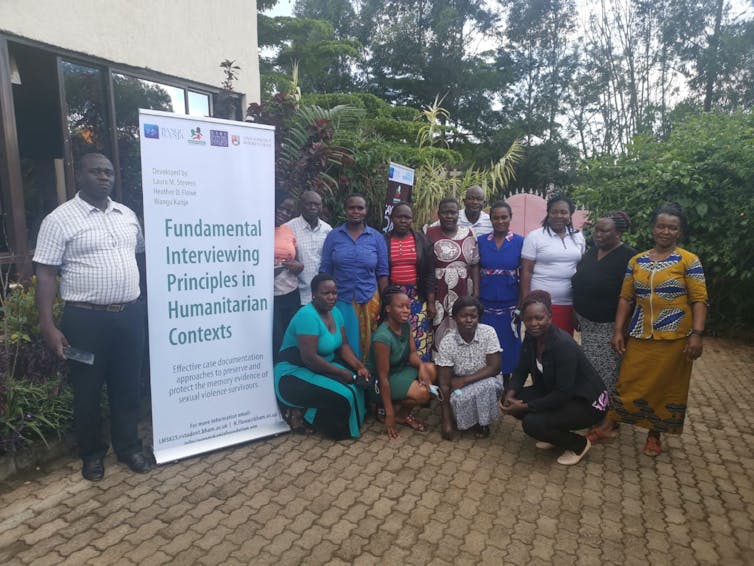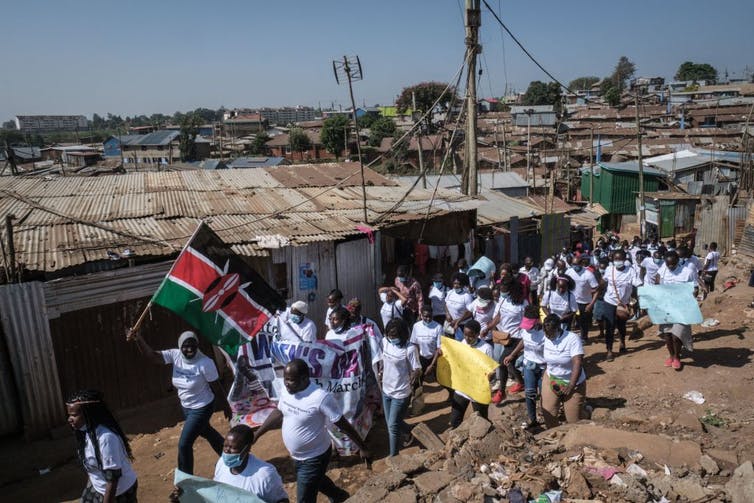Wangu Kanja, University of Birmingham; Heather D. Flowe, University of Birmingham, and Nic Cheeseman, University of Birmingham
There have been recent controversial cuts to the UK’s aid budget – slashed from 0.7% of gross national income to 0.5% last month – which have undermined the country’s commitment to “be a force for good in the world”. The cuts will have a devastating impact on the provision of services in humanitarian crises, such as in Yemen, and it will also affect vital research projects.
UK Research and Innovation (UKRI), the body that controls research funding in the UK, has told universities that projects under the Global Challenges Research Fund (GCRF), part of the UK’s official development assistance, are to be defunded. This is due to a budget shortfall of £120million (US$166million), amounting to a 70% reduction for the financial year 2021-2022.
The Global Challenges Research Fund brings together researchers from the UK and low- and middle-income countries to develop research-led solutions to tackle pressing global issues, such as inequality, poverty, injustice, and the climate crisis. Removing funding from these projects puts people in highly vulnerable situations. These cuts affect all 800 currently funded projects.
Not only does this cause research projects that already are in progress to be halted, if not terminated, but it will also impact future funding opportunities.
This will have huge implications for researchers and critical research topics all over the world.
For instance, our own Global Challenges Research Fund-supported work focuses on ending impunity for sexual violence in Kenya. The political landscape in Kenya means that this budget cut has come at an especially critical time for our project: next year is an election year.
Sexual violence has been associated with election periods in Kenya and is used as a form of political intimidation. Our work increases the capability of human rights defenders in Kenya to document and monitor sexual violence incidents in real time. Our research can, therefore, help to identify perpetrators of election-related rape, deter crimes, and determine areas where critical services are needed to support survivors.
However, unless the cuts are reversed, more women and children will suffer. UK Research and Innovation has left it up to individual universities to decide by April 16 which Global Challenges Research Fund projects will be terminated, and which of the remaining projects face a budget cut of between 50% to 83%.
Critical research
Our team, which includes the Wangu Kanja Foundation, the Survivors of Sexual Violence in Kenya Network (hereafter, the network), and researchers from the University of Birmingham, have been combating sexual violence through the fund.

Lack of data and weak statistical and technical capacity in countries such as Kenya mean incidents of sexual violence are seldom brought to the attention of international audiences. An estimated 17-25% of girls experience sexual violence at least once before the age of 18. Further, historically, survivors have not been “at the table” when prevention and protection policies are developed. Policies are thus often inadequate and poorly executed due to the lack of political goodwill and inadequate resources.
To this end, the Network developed a mobile application in 2018 to collect data from rape survivors across all 47 counties in Kenya. This provides systematic and high-quality data about incidents. The Kenyan government does not systematically record cases or track them.
The lack of official government data contributes to the collective oppression of sexual violence survivors. The work of the survivors’ network is evidencing the scale of these violations and helps to amplify the voices of survivors.
Global Challenges Research Fund cuts threaten to undermine this hard, important work.
COVID-19
The network also recently sought to identify new patterns of sexual violence in Kenya during COVID-19. The results paint a worrying picture for the year ahead. We found that patterns of violence were shifting in the wake of the pandemic. Vulnerability to sexual and other forms of gender-based violence were being exacerbated, particularly for girls and women.
For instance, child victims now appear to be four years younger compared to before the pandemic. Our research is enabling us to urge policymakers to ensure children have access to alternative safe venues when schools are closed, and that Kenya’s COVID-19 emergency management and recovery plans include alternative emergency routes for accessing vital services.
Worryingly, our report also identified an increase in violations (rapes, murders, beatings) by police and security forces throughout the pandemic.
These findings are especially important around elections, which have historically been marred by widespread sexual violence and other human rights violations. Most survivors did not receive urgent medical attention and post-rape care. Those who are supposed to protect people from harm committed the most horrific acts.
Letting down our partners
Removing vital support to survivors and defunding our ability to track cases and hold perpetrators accountable will only serve to worsen the problem, both next year and in the decades that follow.
The stakes could not be higher. Survivors of sexual violence in Kenya rarely receive psycho-social support. Rape is highly stigmatised in Kenya, and victims are left to cope on their own.
Our research is also adapting Preventing Sexual Violence Initiative’s protocol so that it can be used by human rights defenders in low-resource environments. The protocol provides guidance on documenting and investigating sexual violence in conflict so that perpetrators can be brought to justice.
Cutting our project – and others like it – means losing a genuine opportunity to change this situation.
The Wangu Kanja Foundation (WKF) is a 15-year old registered non-profit NGO in Kenya that assists survivors in accessing post-rape care services.![]()
Wangu Kanja, Affiliated Researcher, University of Birmingham; Heather D. Flowe, Reader in Forensic Psychology, University of Birmingham, and Nic Cheeseman, Professor of Democracy, University of Birmingham
This article is republished from The Conversation under a Creative Commons license. Read the original article.

